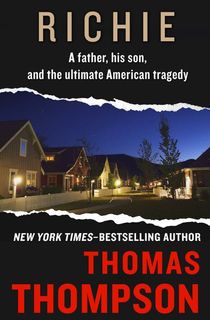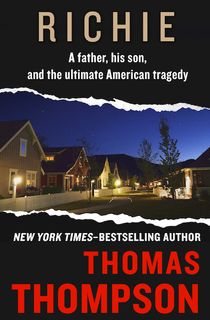It was a nightmare scenario no parent wants to face.
On the night of February 27, 1972, 43-year-old George Diener pointed a gun at his 17-year-old son, Richie. Richie, high on pills, swung a steak knife at George and his wife, Carol. Carol pleaded with her son to stop. Then, George pulled the trigger.
Related: Bitter Blood Murders: A Brutal True Story of Family, Madness, and Death
From the age of 15, Richie had shown signs of aggression. Initially, his parents chalked it up to normal teenage behavior: moodiness, troubles at school. But when Richie began taking Seconals, a barbiturate frequently abused by teenagers in the Diener family's Long Island community, Richie spiraled out of control.
Thomas Thompson’s gripping true crime book Richie, which inspired the 1977 made-for-TV movie The Death of Richie, dives into the troubled life of the Dieners and the heartbreaking decision made by one father who believed he had no choice but to kill his own son.
Read on for an excerpt of Richie by Thomas Thompson and then download the book!
When Richie came into the house near 4:00 P.M., he saw his parents waiting for him at the dining-room table. Pulling out a chair and lounging over its back, he waited silently for their first move. Carol examined his face before she spoke. In it was the flush of drugs, across his hands a tremor as they clenched the chair-back.
“Do you realize what happened, Richard?” she began, in a voice so low and controlled it seemed to be speaking the opening line of a poem. “You could have killed somebody. You could have killed yourself.”
Richie would not look at the woman speaking in the quiet voice. Instead he gazed out the glass patio door onto the redwood deck. Once he had played with the family of squirrels there. Once he had turned on there, on the spring night when thunder came from the sea. Several moments crept by before he found an answer for his mother.
“Maybe that would have been better,” he said, his voice even lower than Carol’s.
George would not have it. He shook his head in reproach.
Suddenly Richie came alive. “That’s right,” he said, his tone-rising. “Shake your fucking head at me.”
What do I do to set off his explosions? thought George. He’s not at all sorry. He’s standing there so stoned he doesn’t even realize what he has done.
Related: 32 Most Horrifying Serial Killer Books
Carol could feel the electricity beginning to crackle between her two men. She jumped back in, continuing to point out the things Richie should consider. If he ever bought his own car, the insurance premium would be enormous because of these accidents. He could even lose his newly obtained license from negligent driving. As she spoke, keeping Richie’s attention, George left the table. It seemed the best thing he could do, for his presence was salt in the wound.
Richie accepted everything his mother told him. She was right. She was definitely right. He would drive more carefully. He was indeed lucky that no one had been hurt. Contritely, he said that he was tired, very tired, and wanted to rest. Could he go to his room? Carol took his hand and squeezed it tenderly to give her permission.
Now Russell, the 11-year-old second son, bounded in. Carol had promised to take him and a friend to the bowling alley. Wearily she remembered her obligation. Thirty minutes later, when she returned, the house was quiet once more. George was in the basement working. She could hear him moving boxes around. The music from Richie’s room meant he was there. She began preparing sandwiches and soup for a light supper.
Abruptly, Richie lurched out of his room and into the kitchen. He seized the telephone and dialed Brick. Carol turned from the stove because there was a new presence in the room. A stranger stood in her kitchen, a stranger with eyes burning, eyes drowning in a crimson sea, eyes little more than slits in a face suddenly puffy and worn and—Carol thought—oddly old. Richie began to talk at the top of his voice. Every other word seemed to be “fucker.” He pronounced them vigorously, as if newly and proudly come to profanity. It was not that Carol had never overheard the words from her son before. But always in the past he had tried to hide his conversations. Now, for some terrible reason, Richie chose to fill his mother’s kitchen with obscene talk. He is forcing me to see him as he really is, thought Carol.
Richie hung up. “I’m going out,” he announced, his words sticking together like taffy.
Almost in pity, Carol gazed at her son. “You’re in no condition to go anywhere,” she said sadly. “You couldn’t make it around the block.”
Ignoring her, Richie bolted from the kitchen into the dining room, where he struck a chair and fell to the floor. The chair toppled beside him. Carol rushed to him, saw him sprawled in pain half on the tile of the dining room, half on the green carpet of the living room. My God, she thought. He’s taken an overdose. He’s dying.
But Richie staggered up, grabbing another chair to support himself. The twin crashes—boy and chair—brought George racing up from the basement.
“What happened?” he asked. Carol could not respond. She could only point. Words could not escape the ice in her throat.
Related: Unsung Horrors: 10 Underrated True Crime Books
Richie whirled and faced his father. “Did you tell the cops back there I was on drugs?” he yelled, jerking his thumb in the general direction of the second accident.
George was taken aback. Why was Richie suddenly angry over something he had not even mentioned at the table an hour ago? He did not answer.
“Goddammit,” said Richie, raising his right arm as a trembling club, “I asked you a question. I want an answer.”
So contorted was his face, so taut with rage, that George left the room. He had an idea. He walked to his bedside table. Outside, behind the slammed door, he could hear his son screaming, “Answer me!” George reached under the table to where he had hidden his .38 the night before when he returned from the charity party. It rested on a carefully placed wire, a secret nest George had built when his other gun had been stolen in the autumn burglary.
George seized the gun, checked to see that it was loaded, stuck it in his belt. The loose-fitting wool plaid shirt he wore covered the bulge at his middle. Wordlessly he opened the door and passed his son and descended the steps to the basement. In his mind was the notion that he could terminate the quarrel by simply getting away from Richie. And if the boy persisted, then the gun would frighten him away, even as the golden mending scissors had sent George racing from the house the week before.
No sooner did George reach the eleventh and bottom step of the stairs than Richie burst onto the top landing. George spun around to face his son. The boy swayed in the half-light from the kitchen. George was illumined by a work light. Darkness fell between them.

Carol and George Diener at Richie’s burial
Photo Credit: For Richie Blog“Did you tell those cops I use dope?” shrieked Richie. Is this the most important unanswered question in his life, wondered George, or is it just his reason to explode?
Unsteadily, Richie made his way down the steps. He never took his eyes from George, father and son locked in a painful visual embrace. When he reached the bottom, Richie looked for the first time about him. He saw an ice pick on a workbench and snatched it. He raised it in his hand and cried, “Answer me! I want an answer! Answer me!”
George’s answer was to reach slowly inside his wool shirt and take the .38 from its hiding place and point it at his firstborn son. This would frighten him. This would send him away. In the movies of his Brooklyn youth, the antagonist always dropped his weapon and backed away at the sight of the gun.
Related: Murder in Little Egypt: John Cavaness, the Small-Town Doctor Who Killed His Son in Cold Blood
But Richie would not cooperate. He flung out his arms like a crucifix. “You’ve got your fucking gun,” he shouted. “Go ahead and use it!” As in a nightmare, one that an awakening would never shatter, Richie began to walk toward his father, arms outstretched, the ice pick glinting in the naked work light.
When he was five feet away, George cocked the .38. The noise was unmistakable. Carol, who had followed Richie silently down the steps and who was now pressed in terror against a wall near her washing machine, cried out, “You two stop it! Please!”
Richie stopped. He thrust his chest forward as if to make the target larger. And he shouted, once more, “Go ahead … Shoot!”
But when George did not fire, Richie dropped his arms and the ice pick fell loudly to the floor. With that, George lunged forward, grabbing his son by both shoulders and shoving him out of the way. At the same time he kicked the ice pick into a corner. Richie wrenched free from his father and rushed upstairs, falling clumsily, crying as he went, “I’m going to get the scissors!”
Carol threw her arms around George. “Oh, my God,” she moaned. “What are we going to do?”
“I don’t know,” said George. “Maybe he won’t come back.” He stroked her hair, but he kept his eyes locked on the top stair.
While they waited fearfully in the cellar, George and Carol could hear Richie rummaging wildly in the kitchen directly above their heads. He pulled a drawer out too far. It crashed to the floor, utensils rattling about like hailstones on a roof.
Within seconds, Richie reappeared at the top of the stairs, this time with a steak knife in his raised right hand. Once more he began the ceremony of descent, crying, with each step, “Shoot! Use your fucking gun!” In insane counterpoint, the family poodle, Bridget, yelped and barked behind him.
George pushed Carol behind him and out of the way. She began to plead, desperately, hysterically, “Oh, my God, you two, please. Oh, please!”
Related: 14 Chilling True Crime Books About Real-Life Kidnappings
George’s finger trembled on the trigger he knew so well. He had fired this gun a thousand times at black and white circles on cardboard squares. He raised the gun in one last show of warning. But Richie refused to heed. He took another step.
Images and questions swam through George’s mind. Before him were the frustrations of his life, telescoped, refusing to go away and let him be. Why had his world come to this? Why was this enemy loose in his house, an enemy he could not understand? His seed had produced a son, but where was the son? What stood before him was not the mirror image, not a son, not with his mouth a generator of hate, not with his hair tossed about by the new winds, not with his arm promising death. It did not occur to George that in this terrible moment was contained Richie’s plea for help. Reason is not always present when the finger is on a trigger.
What God spared Abraham from committing on his son Isaac, what the makers of myth and literature could scarcely imagine, George Diener in the 44th year of an unhappy life at last did.
He fired.
Want to keep reading? Download Richie by Thomas Thompson now!
This post is sponsored by Open Road Media. Thank you for supporting our partners, who make it possible for The Lineup to continue publishing the terrifying stories you love.
All photos via For Richie Blog


